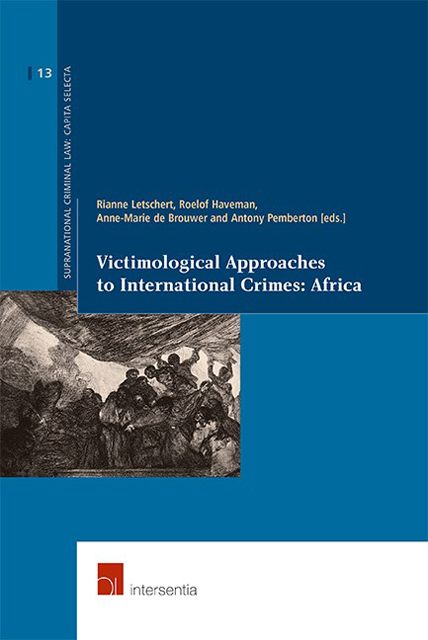Book contents
- Frontmatter
- Words of Appreciation
- Contents
- Introduction: Victimological Approaches to International Crimes
- Part I Victims of International Crimes
- Part II Reparative Justice
- PART III Amnesty, Truth, Reconciliation and Tradition
- Part IV International and National Legal and Policy Approaches
- Part V Victimological Approaches to International Crimes
- The Authors
- Bibliography
X - Drawing the Line: Amnesty, Truth Commissions and Collective Denial
Published online by Cambridge University Press: 24 November 2022
- Frontmatter
- Words of Appreciation
- Contents
- Introduction: Victimological Approaches to International Crimes
- Part I Victims of International Crimes
- Part II Reparative Justice
- PART III Amnesty, Truth, Reconciliation and Tradition
- Part IV International and National Legal and Policy Approaches
- Part V Victimological Approaches to International Crimes
- The Authors
- Bibliography
Summary
INTRODUCTION
Turning a blind eye, looking the other way, averting your gaze, wearing blinkers, living a lie, burying your head in the sand, putting a gloss on the truth. These are some of the expressions and phrases that are commonly used to describe the concept of denial. As individuals, we can be said to ‘live in denial’ when we avoid focusing our attention on information that is too disturbing, unsettling or shameful to be faced and openly acknowledged. The political echoes of these states of mind may be found in official defence mechanisms (‘It didn't happen’, ‘What happened is not what it looks like’, ‘It was an isolated incident’, ‘We had no idea that this was happening’, ‘They brought it on themselves really’, ‘Anyway it was justified’) through which entire societies try to conceal, suppress or dissociate themselves from a record of past atrocities. If such denials of past horrors are initiated by the state, or built into its ideological facade, few would doubt that something wrong is being done. This sort of official denial is immoral, because it involves treating the victims of those wrongs as if they simply did not matter, as if they were politically and morally negligible – an attitude that is disrespectful in its very essence.
The opposite of denial is acknowledgement. To deny that something once happened is to fail to acknowledge that it did happen. This distinction between denial and acknowledgement may look simple enough, but it becomes blurred when one considers the varieties of denial or gradations of acknowledgment (half-truth, evasions, legalistic sophistries and so on) that may appear in official discourse in the Aftermath of collective violence. So what exactly does it mean for a society to ‘acknowledge’ its record of public and political atrocities? And how can this acknowledgement be transformed into action? Part of the answer to these questions will depend on “the nature of the previous regime, its residual power, how the transition happened, and the character of the new society” (Cohen 2001, 222).
- Type
- Chapter
- Information
- Victimological Approaches to International Crimes: Africa , pp. 265 - 288Publisher: IntersentiaPrint publication year: 2011
- 1
- Cited by



